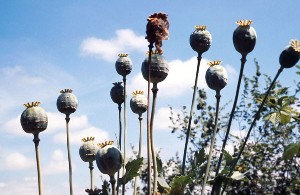Newsbrief:
Clashes
and
Conflict
as
Afghan
"Jihad"
Against
Opium
Gets
Under
Way
1/14/05
Prodded by the United States, Afghanistan's major international donor which has 18,000 troops in the country, Afghan President Hamid Karzai only a month ago promised a "jihad" or holy war against the mainstay of his country's economy: opium. According to the United Nations, opium accounts for two-thirds of the Afghan economy and directly or indirectly supports a large segment of the population, but it is the bane of the West as it morphs into heroin dripping into the veins of junkies from Teheran to Moscow to London.
The fledgling campaign is already stoking conflict and chaos, according to recent reports. As noted here last month, someone reportedly was experimenting with aerial eradication -- although Karzai has said he opposes it and the US denies doing it. Last week, Taliban fighters attacked and killed two soldiers and wounded two more as some 600 soldiers from the Afghan National Army raided newly planted poppy fields in the Deh Rawud district of Uruzgan province, Reuters reported. Governor Jan Mohammed Khan told the news agency a later counter-attack killed two Taliban fighters. Uruzgan has long been a Taliban hotbed, with two US soldiers killed there in an October bomb blast and two more killed in a similar blast in November. In southeastern Afghanistan, tribal leaders this week threatened to burn the homes of people growing poppies -- a tactic the Karzai government quickly disavowed. In a radio broadcast from Khost this week monitored by Reuters, the tribal council there announced that anyone arrested for robbery, setting off explosives, or growing poppies would have their homes torched and be fined the equivalent of $2,000. "All the tribes agreed to obey this agreement and all tribes signed it, so ordinary people in each tribe will obey and respect it," Sultan Mohammad Babrakzai, assistant Head of Tribes Affairs Department in Khost, told the news agency. Babrakzai also offered to burn down the houses of anyone who supports the Taliban or its Al Qaeda allies in the region. The Khost tribal elders are apparently a fiery bunch. Before last October's presidential election, they also offered to burn down the houses of anyone not voting for Karzai, another offer he was eager to refuse. And Karzai was quick to back away from the latest offer as well. "While welcoming the determination of many Afghans to rid the country of the curse of poppies and drug cultivation, the government asks all Afghans to abide by the constitution and laws. The Afghan government is opposed to threats of violence against any Afghan citizen," Karzai's spokesman Khaleeq Ahmad told the news agency. The Afghan government may say pretty words, but it is weak and its influence barely extends beyond the capital, Kabul. Across wide areas of the country, tribal law holds sway. In others, it is effectively ruled by local warlords who are deeply involved in the opium trade, and the Karzai government was sending mixed signals to those powerful players this week, too. According to Agence France Presse, the Karzai government is considering an amnesty for local drug lords as part of its fight against opium. One of the ideas being bruited about is to offer protection from prosecution for traffickers who invest their lucre in the country's reconstruction, said Minister of Rural Rehabilitation and Development Haneef Atmar. "If you have the luxury of state institutions, you don't have to do this. But in Afghanistan you have to be pragmatic and consider different solutions given the precarious security situation," he explained. Atmar valued opium proceeds inside Afghanistan at more than $2 billion last year, adding that the drug trade "was so intertwined with the provincial power structures as to be indistinguishable." With such access to wealth, the warlords could cause serious trouble for the Karzai government, he warned. And so it goes in the early days of "Plan Afghanistan."
| |||||||||||||||||||||||||||||||||||||||||||||||||||||||||||||||||||||||||||||

